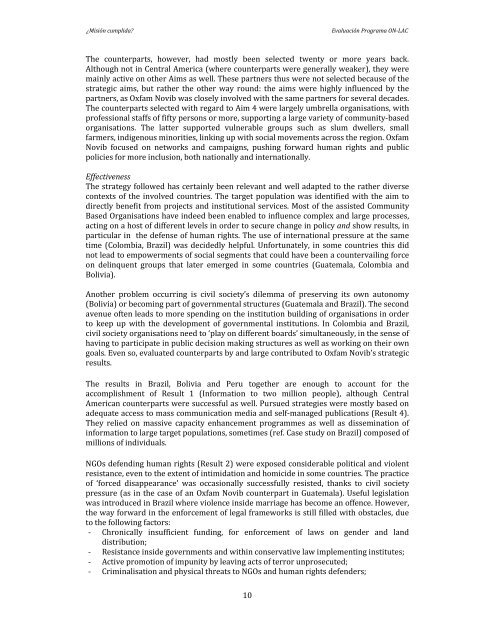¿MISION CUMPLIDA? EVALUACIÓN DEL PROGRAMA DE ... - Novib
¿MISION CUMPLIDA? EVALUACIÓN DEL PROGRAMA DE ... - Novib
¿MISION CUMPLIDA? EVALUACIÓN DEL PROGRAMA DE ... - Novib
Create successful ePaper yourself
Turn your PDF publications into a flip-book with our unique Google optimized e-Paper software.
¿Misión cumplida? Evaluación Programa ON-LAC<br />
The counterparts, however, had mostly been selected twenty or more years back.<br />
Although not in Central America (where counterparts were generally weaker), they were<br />
mainly active on other Aims as well. These partners thus were not selected because of the<br />
strategic aims, but rather the other way round: the aims were highly influenced by the<br />
partners, as Oxfam <strong>Novib</strong> was closely involved with the same partners for several decades.<br />
The counterparts selected with regard to Aim 4 were largely umbrella organisations, with<br />
professional staffs of fifty persons or more, supporting a large variety of community-based<br />
organisations. The latter supported vulnerable groups such as slum dwellers, small<br />
farmers, indigenous minorities, linking up with social movements across the region. Oxfam<br />
<strong>Novib</strong> focused on networks and campaigns, pushing forward human rights and public<br />
policies for more inclusion, both nationally and internationally.<br />
Effectiveness<br />
The strategy followed has certainly been relevant and well adapted to the rather diverse<br />
contexts of the involved countries. The target population was identified with the aim to<br />
directly benefit from projects and institutional services. Most of the assisted Community<br />
Based Organisations have indeed been enabled to influence complex and large processes,<br />
acting on a host of different levels in order to secure change in policy and show results, in<br />
particular in the defense of human rights. The use of international pressure at the same<br />
time (Colombia, Brazil) was decidedly helpful. Unfortunately, in some countries this did<br />
not lead to empowerments of social segments that could have been a countervailing force<br />
on delinquent groups that later emerged in some countries (Guatemala, Colombia and<br />
Bolivia).<br />
Another problem occurring is civil society’s dilemma of preserving its own autonomy<br />
(Bolivia) or becoming part of governmental structures (Guatemala and Brazil). The second<br />
avenue often leads to more spending on the institution building of organisations in order<br />
to keep up with the development of governmental institutions. In Colombia and Brazil,<br />
civil society organisations need to ‘play on different boards’ simultaneously, in the sense of<br />
having to participate in public decision making structures as well as working on their own<br />
goals. Even so, evaluated counterparts by and large contributed to Oxfam <strong>Novib</strong>’s strategic<br />
results.<br />
The results in Brazil, Bolivia and Peru together are enough to account for the<br />
accomplishment of Result 1 (Information to two million people), although Central<br />
American counterparts were successful as well. Pursued strategies were mostly based on<br />
adequate access to mass communication media and self-managed publications (Result 4).<br />
They relied on massive capacity enhancement programmes as well as dissemination of<br />
information to large target populations, sometimes (ref. Case study on Brazil) composed of<br />
millions of individuals.<br />
NGOs defending human rights (Result 2) were exposed considerable political and violent<br />
resistance, even to the extent of intimidation and homicide in some countries. The practice<br />
of ‘forced disappearance’ was occasionally successfully resisted, thanks to civil society<br />
pressure (as in the case of an Oxfam <strong>Novib</strong> counterpart in Guatemala). Useful legislation<br />
was introduced in Brazil where violence inside marriage has become an offence. However,<br />
the way forward in the enforcement of legal frameworks is still filled with obstacles, due<br />
to the following factors:<br />
- Chronically insufficient funding, for enforcement of laws on gender and land<br />
distribution;<br />
- Resistance inside governments and within conservative law implementing institutes;<br />
- Active promotion of impunity by leaving acts of terror unprosecuted;<br />
- Criminalisation and physical threats to NGOs and human rights defenders;<br />
10



